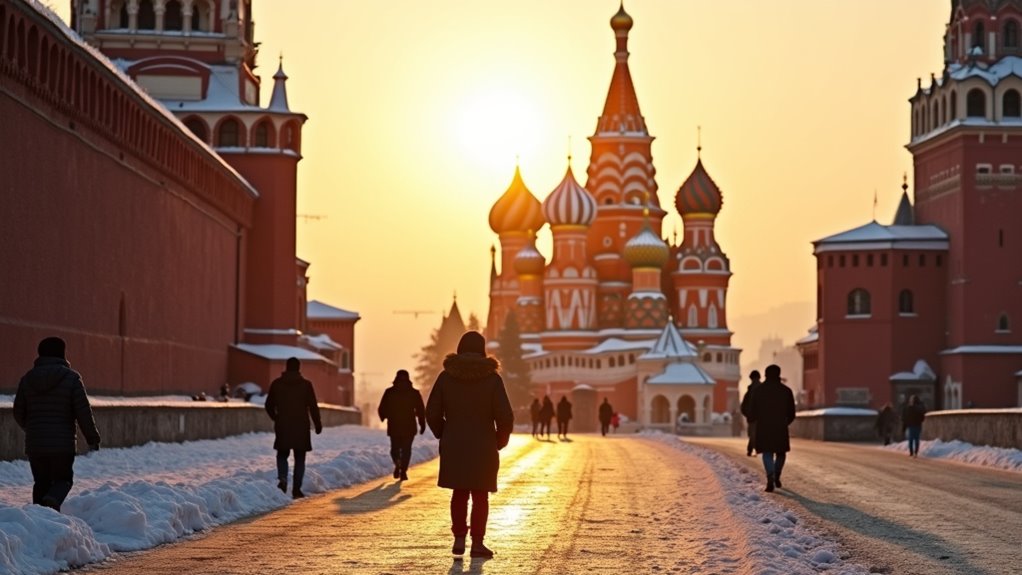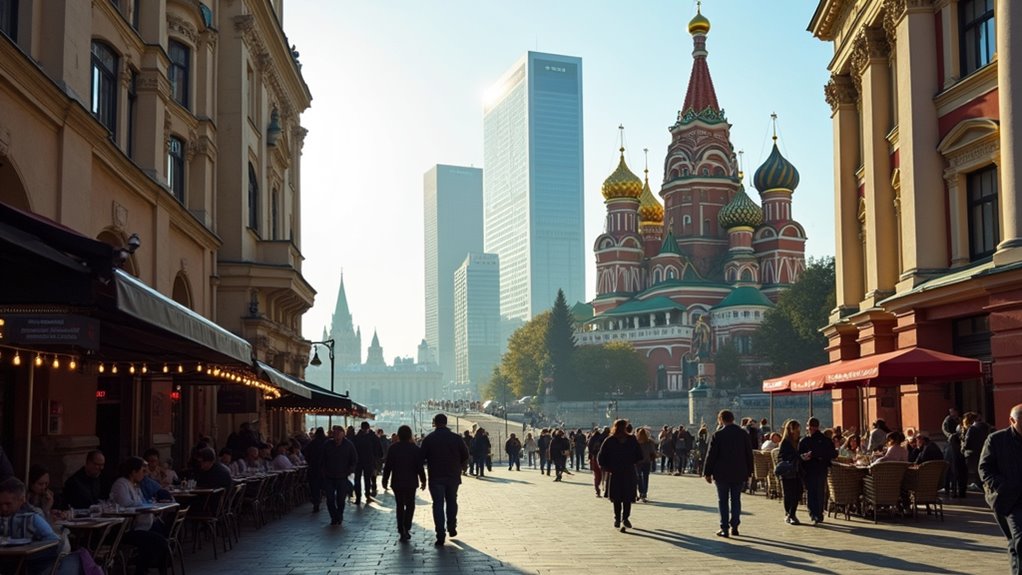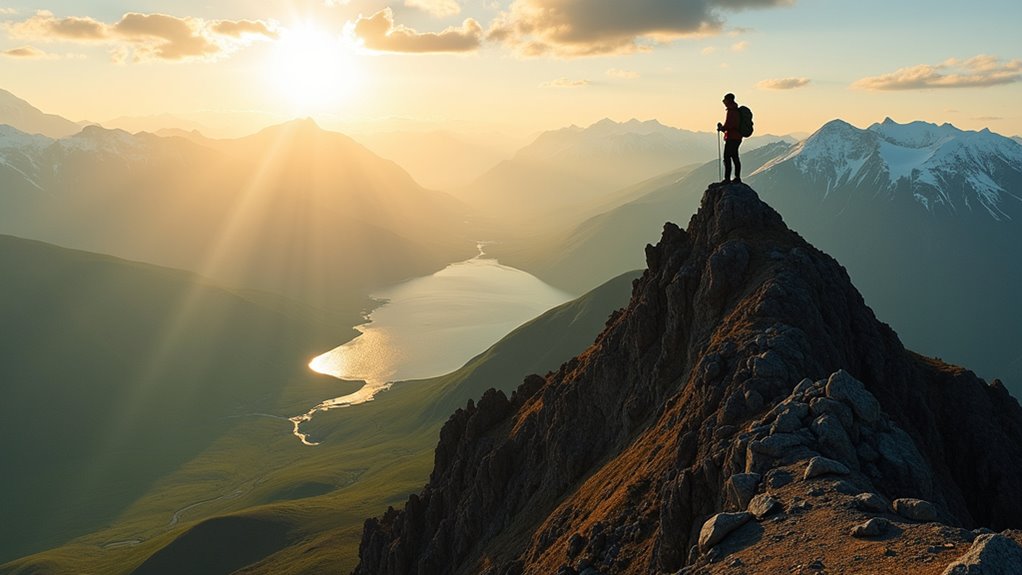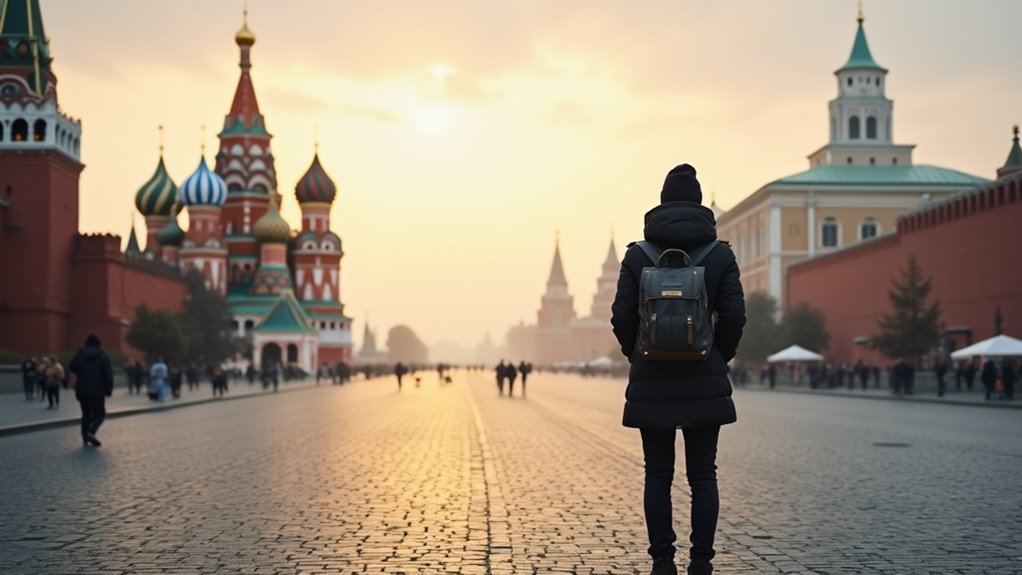Physical Address
304 North Cardinal St.
Dorchester Center, MA 02124
Physical Address
304 North Cardinal St.
Dorchester Center, MA 02124

Holding unrivaled cultural treasures and natural spectacles, Russia beckons travelers despite its complex accessibility challenges.
Russia offers incredible cultural treasures like the Kremlin and St. Petersburg’s historic center, alongside natural wonders including Lake Baikal and the Kamchatka Peninsula. While tourism infrastructure is improving with new hotels and better connectivity, current geopolitical tensions complicate visa processes and travel logistics. You’ll need to weigh the extraordinary experiences against practical challenges. The following insights will help you make an informed decision about experiencing this complex destination.

While Russia’s tourism industry has weathered significant storms in recent years, the numbers tell a story of resilience and potential. The sector took a massive hit during the pandemic, with international receipts plummeting 71% to just $4.96 billion in 2020, down from the 2019 high of $17.24 billion.
Despite dramatic pandemic losses, Russia’s tourism industry shows remarkable resilience and growth potential
Yet the future looks promising. The Travel & Tourism market is projected to reach $18.07 billion by 2025, potentially exceeding the 2018 peak of $18.74 billion. Tourist arrivals are expected to show a protracted recovery through 2025-2029, with 2025 figures increasing from 2024 but still remaining below pre-pandemic levels. Despite these challenges, Russia remains an appealing destination for travelers seeking alternatives to luxury European spots that have become increasingly crowded and expensive.
What’s particularly remarkable is Russia’s outbound tourism surge, expected to grow from $46.2 billion in 2025 to a staggering $105.7 billion by 2035.
You’ll find the domestic tourism landscape shifting too, with sanctions inadvertently boosting local travel as Russians seek alternatives to restricted international destinations.
Why does Russia consistently captivate cultural enthusiasts and history buffs? With 32 UNESCO World Heritage Sites and 31 more on the tentative list, you’ll discover an astonishing concentration of cultural and architectural marvels spanning centuries.
<
ul>
Russia actively promotes youth engagement in heritage preservation through international forums that connect young people with the country’s remarkable cultural and natural sites.

Beyond Russia’s architectural splendors lies a natural wilderness that few countries can rival in scale and diversity. You’ll find Lake Baikal, the world’s deepest freshwater lake, home to unique species like Baikal seals and perfect for winter ice skating or summer hiking.
The Kamchatka Peninsula offers 160+ volcanoes and the spectacular Valley of Geysers, accessible via helicopter tours. The Valley is renowned for its columns of steam that create otherworldly landscapes where bears sometimes bathe in natural mud pools.
In the Altai Mountains, you can trek to Mount Belukha or raft the Katun River while experiencing nomadic cultures at the crossroads of four countries. While Russia’s landscapes offer dramatic contrasts to the crystal waters found in Mediterranean destinations, the diversity of experiences more than compensates.
Don’t miss the Lena Pillars, 500m-tall limestone formations best viewed by boat, or the mystical Manpupuner stone monoliths in the Urals, where Mansi legends tell of giants turned to stone.
Each destination combines breathtaking landscapes with distinctive adventure opportunities.
Exploring Russia’s vast territory requires understanding its evolving travel infrastructure, which continues to develop despite international challenges. The government is investing heavily in tourism facilities, with 27 billion rubles allocated for infrastructure development through 2027.
When planning your Russian adventure, consider these key logistics:
The “Tourism and Hospitality Industry” national project aims to increase domestic tourism to 140 million trips by 2030, meaning you’ll find continuously improving facilities throughout your journey across this massive country. The projected 145.31 million total air passengers in 2025 indicates Russia’s growing capacity to handle increasing tourism demands. While Russia offers impressive attractions, travelers should prepare for varying costs depending on major cities versus rural areas, similar to how budget travel options vary significantly across Eastern European destinations.

Russia’s complex position on the global stage considerably impacts your experience as a traveler in this vast nation. Ongoing sanctions and diplomatic tensions might affect everything from your visa application process to the general reception you’ll encounter.
Recent e-visa policies have made entry easier for citizens of certain countries, though geopolitical realities can still create obstacles. The dramatic drop in tourism revenue from $17.24 billion in 2019 to just $4.96 billion in 2020 reflects how vulnerable the sector is to global disruptions. While the tourism sector projects growth to $18.07 billion by 2025, your experience will vary depending on which regions you visit, as some areas feel international tensions more acutely than others.
Despite these challenges, Russia’s opulent cultural offerings—from the Kremlin to natural wonders—remain accessible. Language barriers exist but aren’t insurmountable. Your perception of safety and hospitality will largely depend on specific locations and current global circumstances. Travelers unsure about visiting Russia might consider Poland’s major cities as an alternative destination with rich Slavic cultural experiences but fewer diplomatic complications.
Russia isn’t everyone’s cup of tea right now, but it offers undeniable treasures for the adventurous traveler. If you’re willing to navigate complex logistics and current geopolitical tensions, you’ll find extraordinary cultural wealth and natural beauty waiting. Consider your personal comfort with current relations, travel restrictions, and safety concerns before deciding. When conditions improve, Russia’s remarkable heritage and landscapes will still be there to explore.